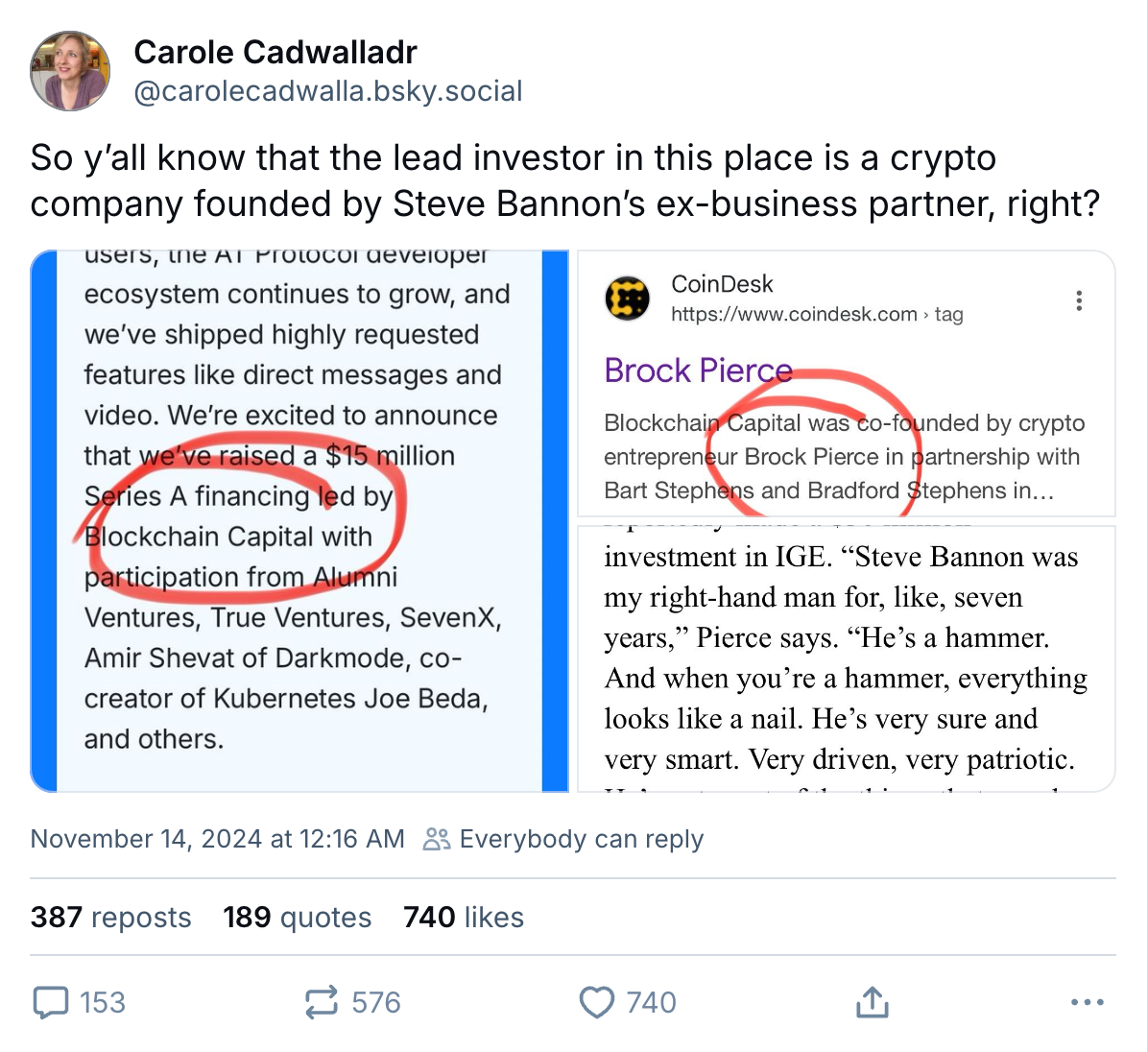The People vs Centralisation
Is Elon Musk accidentally helping us break up Big Tech? 🤯

So there we have it. A Tech Bro is literally in the White House leading a department named after a dog meme-come-cryptocurrency.
But all may not be lost. Since the election, millions of us found a flutter of hope by joining X alternative Bluesky 🦋
While the number of people on the platform is still small compared to its Big Tech rivals, it did top the App Store’s free download charts in the US yesterday.
It feels quite literally like people versus Big Tech. People and news outlets are resisting Elon Musk’s radicalisation and undue influence over US politics by choosing to leave or stop using his platform.
In the future will we simply migrate from platform to platform, leaving tech run by companies which are no longer serving us – but keeping our identity, network and content? Are we all digital nomads now?
This could be the start of a welcome throwback to the early decentralised internet days. Back then, the focus was not on platforms, but protocols: open instructions that anyone can use to build different apps that work in different ways.
Bluesky is powered by something called the AT Protocol, an open-source decentralised network for building social apps.
It creates a standard format for user identity, follows, and data on social apps, making it easy for us to move our stuff between apps that are ’interoperable’. As Bluesky has stated:
“You’ll always have the freedom to choose (and to exit) instead of being held to the whims of private companies or black box algorithms… And wherever you go, your friends and relationships will be there too”.
They also offer algorithmic choice. Unlike the toxic, addictive algorithms used by Big Tech to keep us hooked to our devices, you can choose to keep the default – posts from the people you’re following in chronological order – or you can add more feeds focused on your interests.
So what’s the catch? We asked researcher and developer Robin Berjon, who specialises in decentralising tech. He believes Bluesky is “really dedicated to making sure that what they build is resilient and stays in the hands of its users, even in case their own company becomes bad.”
But it is a private company, and Robin would like to see them handing over management of people’s identities on their platform to community governance, perhaps via a third party nonprofit. He also added that we need “more community systems built on the back of the same protocol…to spread out and diffuse power.”
Bluesky is currently one of just a handful of platforms which use the AT Protocol. It also uses a different protocol from the likes of Threads and fellow X alternative Mastodon, which some say makes federation (allowing anyone to run parts of the protocol) more difficult. Mastodon also differs by not using algorithms at all, but many argue is not user-friendly enough.
Bluesky plugs itself as “billionaire proof” because if there was an aggressive takeover of the company, users could simply move their data to a rival service, or host their own server.
If the protocol is strong enough, this is true. But it’s still too early to tell if Bluesky is immune to the interests of far-right sympathising billionaires:

There have also been reports criticising the platform's content moderation capabilities, from white supremacists use of the Bluesky 'lists' function to the censorship of Palestinian voices.
Still, Robin thinks the AT Protocol is the best shot we have at tech decentralisation for now. By using different systems for each component in apps like Bluesky, he said, “they’ve done a really good job of making sure that concentration of power is difficult or impossible.”
Your next digital destination 🧳🧳
Millions of people around the world are sending a strong message to Big Tech companies by abandoning X. But the problem doesn’t end with Elon Musk or X. Let’s break up all Big Tech monopolies and keep being nomadic online. Here are a few alternative, free, privacy-focused bits of tech to download now:
👾 SIGNAL. The non-profit messaging app and WhatsApp alternative, with new video call features making it a viable Zoom/Meet/Teams replacement too. Download on the App Store here and Google Play here.
👾 PROTON MAIL. Proton is a promising alternative to Google, and much more secure. And they’ve put out a Google Docs alternative. Set up your account here, download the app on the App Store here and Google Play here.
👾 DUCKDUCKGO. A privacy centric search engine and browser which has been going since 2008. Download it here, or via the App Store here or Google Play here.
👾 FIREFOX. The free and open source web browser backed by non-profit Mozilla. Download it here, or via the App Store here or Google Play here.
Thanks for reading!


